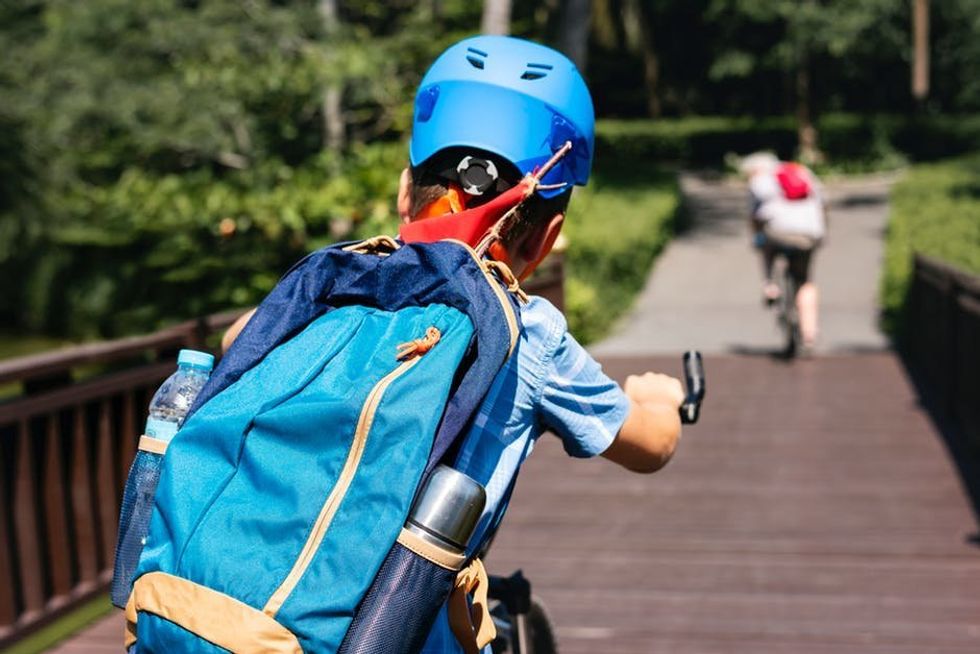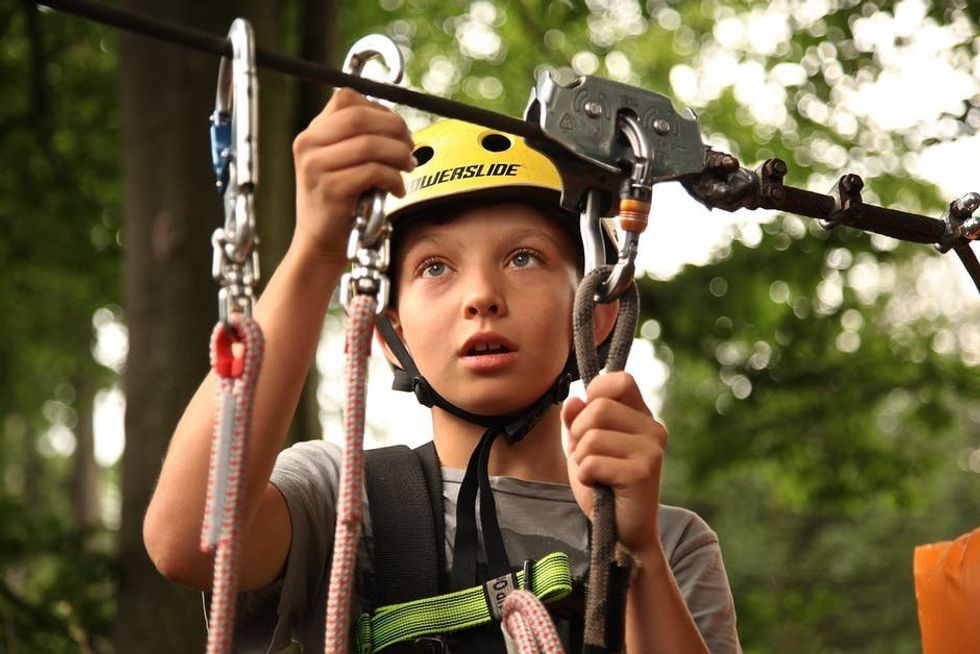I am a senior nutrition and dietetics student in southeast Pennsylvania. A few weeks ago I received an invitation in my school email to apply for a position at a children's weight loss camp. I was confused and angry.
I always believed weight loss camp was just fodder for weird Ben Stiller movies from the '90s.
I honestly did not believe people were still sending their kids to these places.
So I did some research. All of the websites I visited talked about "lifestyle changes," "confidence," and "obesity epidemic." These are all major buzzwords associated with diet culture that really just have dollar signs written all over them.
If a child is healthy enough to spend all summer outdoors and away from home, and they want to go away to camp, why not send them to a summer camp where the main goal is to have fun? Weight loss camps market in a way that makes it sound as though other summer camps are not being held to the same standard of nutrition of weight loss camps, which legally, cannot be true. Can it?
So then, why don't all summer camps include healthy lifestyle as part of the curriculum? Maybe because they're already eating three healthy meals and running around all day?
As part of my research, I informally polled two populations of people. The question was "Is weight loss camp for children ethical?" The first population was Odyssey writers who were mostly not involved in nutrition. Only 53% answered YES. I asked the same of my Instagram which is mostly made of nutrition-related followers and 70% answered NO. Every person who answered YES was not involved in nutrition in any way. Almost all of the people who answered NO were involved in nutrition as a student or as a dietitian.
This shows me that nutrition professionals know something about this that the rest don't. As a society, we are more concerned with the weight of a child than the well-being of the child. Weight and well-being are not interchangeable. Fat camp is unethical and should be discontinued. If you still don't believe me, read on.
1. Children's bodies are meant to grow

The whole goal of a child's body is to grow. Cells are splitting. Bones are lengthening. Brain is wrinkling. This takes energy, AKA calories! Weight loss during childhood can inhibit growth. The development of children is imperative to their ability to be functioning adults. Weight gain during childhood is expected and normal. Perceptible weight gain is especially expected in the time before puberty. Ethical weight management for children focuses on maintenance, not weight-loss. Maintenance programs focus on parental involvement and a family approach to learning healthful behaviors. Significant and severe weight-loss may also signal hunger hormones and make food-seeking the top priority.
"I remember going from 5th to 6th grade and my body went through some wonky changes that year. I'll never forget my Mom saying that she wouldn't be buying my clothes in a certain size, so I lost weight that summer." - Anonymous, 28
2. Research does not support successful long-term weight loss

The evidence has become overwhelmingly negative on the subject of weight-loss intervention. Diets fail. The human body has evolved through periods of low caloric intake, starvation, intermittent eating patterns, and times of overeating. All of that is true and yet humanity has persisted. This is, in part, because of sensitive hormone regulation and homeostasis. Our bodies are excellent at making sure we don't die. This has been terrible news for many people who have chronically dieted, but the evidence is there. So, if research does not support these practices, why are they still allowed to be acted upon children? Doctors would not be able to prescribe medication to children that failed in the research. I don't believe there is anything ethical about treating children outside of evidence-based practice.
"I feel like it is important to educate children on the importance of living a healthy lifestyle, but at the same time we need to do it in a way that is encouraging and productive instead of making it about weight loss." Anonymous, 20
3. Affirmation of bad body image

There are many people ready to throw around the phrase "obesity epidemic" when they have never studied epidemiology, nutrition, or even anatomy. There are many people who say that kids will be teased if they are larger than average, without regard to radical ideas like, maybe, finding a way to stop bullying. Kids are subjected to judgment from every possible source and angle from the time they can toddle. Sending them away to lose weight teaches them that their body is a problem that needs to be solved. That their body is the problem. How can these children be expected to be mentally and physically healthy adults? Performative behavior such as losing weight to fit a predetermined mold of "healthy" is psychologically damaging, and discounts much of the evidence about supporting positive body image.
20% of teens are either "rarely" or "never" happy with their body image
52% feel that the media pressures them to change their body image
73% of teens feel their appearance affects their body image
65% of teens are afraid of gaining weight
44% of teens skip meals as a tactic to losing or controlling weight
31% of teens have been on a diet in the last six months
31% of teens have at least one body part on which they would like to get surgery
56% of teens feel that the media's advertisements are the main cause of low self-esteem
4. The environment is temporary, like the results

Eventually, summer ends and the children who spent all their time focused on fun, calorie-burning activities go back home to their families. It is unethical to teach children that their lifestyle is their responsibility, and then remove them from the same environment that let them feel success with that responsibility. Environment accounts for so much when it comes to health outcomes. Factors like access to nutritious food, playgrounds, supportive friends and family all contribute. Providing a trifecta of factors for weight loss, making a camper feel like their hard work has paid off, and then sending them home, is cruel. The weight-loss camps boast tools for when the kids go home, but really the "magic" of camp is the change of environment. The feeling of success dissipates with every pound gained back, and then by the time summer comes again, the dismay and self-esteem issues send them right back to camp.
5. Every children's camp should have that level of care

One of the other things that these fat camps boast, (besides unsustainable, unrealistic tools), is the team of dietitians, doctors, counselors, and fitness experts on staff. This is an unreasonable selling point. Every camp should have these people on staff. Anywhere there are children, engaging in outdoor activity, being fed on a large scale, and without the care of their parents, these standards should be in place. If that were true, and ethically practiced, every summer camp could be a place where body image, bullying, increased physical activity, and learning health skills are addressed. The fact that fat camps cost extra thousands beyond regular plain summer camps is mind-boggling. Where is the money going? Better food? Better activities? Better staff? That doesn't sit well with me. All summer camps should be weight inclusive and focused on fun, and health. If it costs more to bring the quality up to standard, so be it. That should be the cost.
It is time to separate wellbeing and weight and make all summer camps weight inclusive. We need to teach our children that their bodies are vessels for their growth as people. Helping kids to understand the changes they are going through in an age-appropriate way, and working towards an understanding of health, is paramount to healthy body image. All bodies are good bodies. Fat camps belong in the past and I'm ready to see them go. I'm ready to never get another job invitation to one ever again. Almost all of the nutrition professionals I spoke to on this subject felt the same. I hope that those who disagree will come to see that healthy children exist in many body types and that ethical care means accepting that as fact. Evidence-based practice should be the minimum standard of care of all people, but especially children away from their parents and guardians.





















